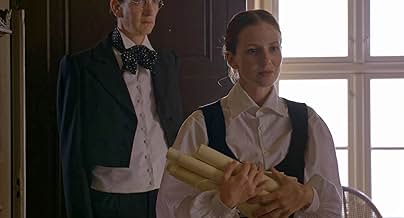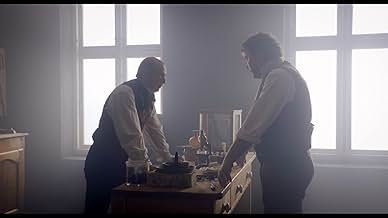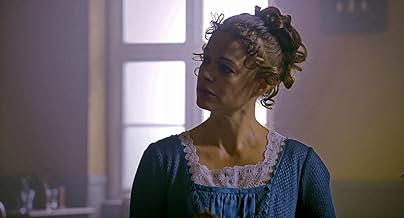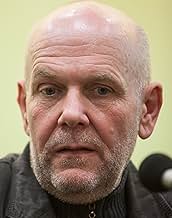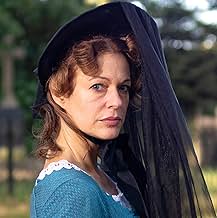IMDb RATING
7.2/10
3.9K
YOUR RATING
1828 in the German port city of Bremen: A female law clerk tries to prove her worth during the investigation of a series of poisonings.1828 in the German port city of Bremen: A female law clerk tries to prove her worth during the investigation of a series of poisonings.1828 in the German port city of Bremen: A female law clerk tries to prove her worth during the investigation of a series of poisonings.
- Director
- Writers
- Stars
- Awards
- 29 wins & 22 nominations total
- Director
- Writers
- All cast & crew
- Production, box office & more at IMDbPro
Featured reviews
The fact that this movie draws its inspiration from actual events significantly enhanced my enjoyment and appreciation of it. The filmmakers deserve commendation for their ability to present a narrative that not only engages but also incorporates a strong feminist perspective, executed both artfully and convincingly. The performances were exceptional, particularly those of the actress portraying the female serial killer and her counterpart, the nemesis character. Their portrayals were both compelling and immersive, adding depth to the storyline.
Additionally, the music score of the film was a standout feature. It complemented the mood and tone of the movie beautifully, weaving seamlessly with the narrative to enhance the overall experience. On the other hand, the subplot, which aimed to enrich the film by providing political context, fell somewhat short for me. Although it was an interesting addition, I found it somewhat elusive and challenging to fully grasp as an average viewer. This aspect didn't diminish my overall enjoyment of the film but was a noticeable contrast to the otherwise engaging storytelling.
Looking forward, I am genuinely excited and eagerly anticipating more work from the director, Udo Flohr. His unique approach to storytelling and his ability to bring complex characters to life are truly commendable, and I am keen to see how his future projects unfold.
Additionally, the music score of the film was a standout feature. It complemented the mood and tone of the movie beautifully, weaving seamlessly with the narrative to enhance the overall experience. On the other hand, the subplot, which aimed to enrich the film by providing political context, fell somewhat short for me. Although it was an interesting addition, I found it somewhat elusive and challenging to fully grasp as an average viewer. This aspect didn't diminish my overall enjoyment of the film but was a noticeable contrast to the otherwise engaging storytelling.
Looking forward, I am genuinely excited and eagerly anticipating more work from the director, Udo Flohr. His unique approach to storytelling and his ability to bring complex characters to life are truly commendable, and I am keen to see how his future projects unfold.
10gareth33
The film's foundation in a true story significantly and it really impacted my admiration for it. Kudos for adeptly and artistically presenting the narrative with a robust feminist perspective. The custom-composed film score, executed by a 40-piece orchestra, is masterfully crafted and seamlessly aligns with the overall film ambiance. While not adhering to a modest budget, this isn't your typical Hollywood production, demanding your focused engagement. However, the investment is undeniably rewarding, even for those who aren't typically drawn to historical dialogues. Encountering films like this isn't a frequent occurrence, so I'm genuinely pleased to have come across it. I'll definitely make a point to recommend it to my family and friends.
In this gripping real-life narrative, two formidable women deliver compelling performances at the forefront.
The tale's authenticity lends credence to its chilling plot: in Bremen, a seemingly meek yet cunning woman, responsible for poisoning about 15 individuals over several years, truly existed. I viewed this film in a German cinema near Bremen, where locals are familiar with this historical incident.
The movie portrays the murderer as jealous of her adversary, Cato Böhmer, a young law clerk, reflecting on her motivations and psychological state, yet her actions largely remain enigmatic, leaving the audience with lingering questions. Why did she commit multiple murders while maintaining a facade of compassion?
The film stands out for its clear, enjoyable dialogue, a refreshing change from many modern movies that often use mumbled lines or drown conversations with loud music or background noise.
The original score, masterfully executed by a 40-member orchestra, beautifully complements the film's mood.
Set around 1830, the plot intertwines with the technological and economic progress of the time, including railroad construction in Northern Germany and historical settings. An intriguing aspect is the depiction of a mechanical copying device, unfamiliar to me.
This film is a must-watch, not just for enthusiasts of historical narratives. I eagerly anticipate Udo Flohr's next creation and hope for the continued casting of such dynamic performers.
The tale's authenticity lends credence to its chilling plot: in Bremen, a seemingly meek yet cunning woman, responsible for poisoning about 15 individuals over several years, truly existed. I viewed this film in a German cinema near Bremen, where locals are familiar with this historical incident.
The movie portrays the murderer as jealous of her adversary, Cato Böhmer, a young law clerk, reflecting on her motivations and psychological state, yet her actions largely remain enigmatic, leaving the audience with lingering questions. Why did she commit multiple murders while maintaining a facade of compassion?
The film stands out for its clear, enjoyable dialogue, a refreshing change from many modern movies that often use mumbled lines or drown conversations with loud music or background noise.
The original score, masterfully executed by a 40-member orchestra, beautifully complements the film's mood.
Set around 1830, the plot intertwines with the technological and economic progress of the time, including railroad construction in Northern Germany and historical settings. An intriguing aspect is the depiction of a mechanical copying device, unfamiliar to me.
This film is a must-watch, not just for enthusiasts of historical narratives. I eagerly anticipate Udo Flohr's next creation and hope for the continued casting of such dynamic performers.
In this true story, two formidable women deliver impactful performances at the forefront. The narrative, if fabricated, would seem implausively exaggerated. It's unsettling to realize that the seemingly benign yet cunning woman who poisoned about 15 people over years in Bremen actually existed. I viewed this film in a German city close to Bremen, where locals are familiar with this historical incident.
In the movie, the murderess is depicted as jealous of the talents and status of her adversary, the young legal assistant Cato Böhmer. While there are some plausible theories about the murderer's motives and mindset, her actions largely remain an enigma, leaving viewers with lingering questions. What drove her to commit numerous murders while maintaining a facade of benevolence?
The film's dialogue stands out for its clarity, a refreshing change from modern movies that often feature mumbled lines or overpowering background sounds.
The score, created by a 40-member orchestra, beautifully enhances the film's mood.
The plot weaves in the technological and economic progress of the 1830s, educating viewers on railway development in Northern Germany against a backdrop of historical scenery. An intriguing aspect is the depiction of an early mechanical copier, a device I was unfamiliar with.
This movie is a must-see, transcending appeal beyond historical dialogue enthusiasts. I eagerly anticipate Udo Flohr's next creation and hope he continues to cast such compelling actors.
In the movie, the murderess is depicted as jealous of the talents and status of her adversary, the young legal assistant Cato Böhmer. While there are some plausible theories about the murderer's motives and mindset, her actions largely remain an enigma, leaving viewers with lingering questions. What drove her to commit numerous murders while maintaining a facade of benevolence?
The film's dialogue stands out for its clarity, a refreshing change from modern movies that often feature mumbled lines or overpowering background sounds.
The score, created by a 40-member orchestra, beautifully enhances the film's mood.
The plot weaves in the technological and economic progress of the 1830s, educating viewers on railway development in Northern Germany against a backdrop of historical scenery. An intriguing aspect is the depiction of an early mechanical copier, a device I was unfamiliar with.
This movie is a must-see, transcending appeal beyond historical dialogue enthusiasts. I eagerly anticipate Udo Flohr's next creation and hope he continues to cast such compelling actors.
How did I just hear of this film? This is actually based on a true story and I absolutely loved it. Lots of positive things to talk about here from the set designs to the costumes and the actress Suzan Anbeh, super talented as she really made this film come alive. The story is deep and has plenty of plot twists and the ending really had me by surprise. This isn't your typical Hollywood film so you will need to pay attention but it's totally worth it. The script is solid and is award winning. It's not so often you find films like this so I'm glad I found this and i'll be sure to recommend it to family and friends.
- How long is Effigy: Poison and the City?Powered by Alexa
Details
- Release date
- Countries of origin
- Official sites
- Languages
- Also known as
- Effigie - Das Gift und die Stadt
- Filming locations
- Mecklenburg, Germany(location)
- Production company
- See more company credits at IMDbPro
Box office
- Budget
- $485,000 (estimated)
- Runtime
- 1h 25m(85 min)
- Color
- Sound mix
- Aspect ratio
- 1.85 : 1
Contribute to this page
Suggest an edit or add missing content





